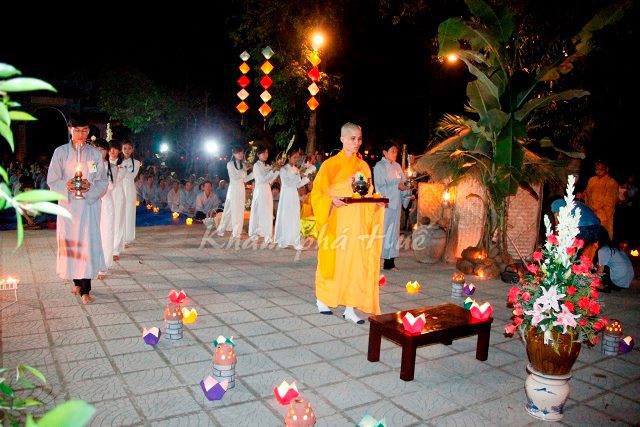The usual ritual in the Vu Lan festival at the pagoda is the master of chanting and reciting the sutras. The believers kneel according to the ritual. If a congregation comes to the temple to worship, the master of the ceremony, after the initial rituals, allows all members to read filial piety. After the official ceremony, he talked about the meaning of Vu Lan, reminding the members to repay their parents with specific actions. Blessed people are who still have their parents to take care of and filial piety in accordance with the Buddha's teaching to create a happy and warm family.
Vu Lan - the day toward the origin
However, I do not know when, Vu Lan is no longer a private holiday of Buddhist monks and nuns, no longer encapsulated in the temple but become a day for anyone to have the opportunity to show hospitality to their mother, and not only their mother, including their ancestors.
Also coinciding with the Vu Lan festival, the full moon day of the seventh lunar month in Asian folklore is also the day of remission of sins of Asian customs, a day for people to show respect to their parents and grandparents and also to help hungry souls.
These days, many Hue people visit tombs and burn incense for the deceased, many families there is the table of foods offered in front of the house, to worship the helpless spirits, also known by folklore as "worshiping the soul, " "offering alms" (giving food).


Buddhists wearing blue robes come to the pagoda to worship on Vu Lan day
On this day, every family sacrifices two trays: worship ancestors at the ancestral altar and worship sentient beings (offering alms or offering souls) in the front yard of the house or on the sidewalk (if the road is wide), the time of worship can be in the morning, noon or afternoon.
On the ancestral offerings table, the family sets up a tray of salty (or vegetarian), gold coins and even items for the people of the Underworld - paper kits made of symbolism such as clothes, shoes, shirts, palaces, horses, jewelry items... so that the people of the underworld can have a comfortable life like the living people. Currently, despite the minimalism of many rituals, for Hue people, the concept of "Yin an Yang are the same" is thoroughly applied. No matter how difficult the family conditions are, on the offering table, there is a bit of everything.
On the table of worshiping sentient beings, the offerings include clothes with many colors (blue, green, yellow, pink...), fruits, explosive seeds, green bean tea, waffles, porridge, gold coins, a glass of water or wine, a cup of rice mixed with salt (this cup will be sprinkled on the sidewalk or yard in four directions after the offering is completed), corn, boiled sweet potatoes, holy porridge... and other offerings for helpless ghosts and hungry ghosts. At the temple, when worshiping sentient beings, people often call the children around and then let them jump into the competition to steal offerings. It represents the souls...
According to folklore, from July 2, King of the Underworld ordered the opening of the Demon Gate and on the full moon of July, "let the door open" for the devil to pour out in all directions, until after 7 pm on July 12 it wa